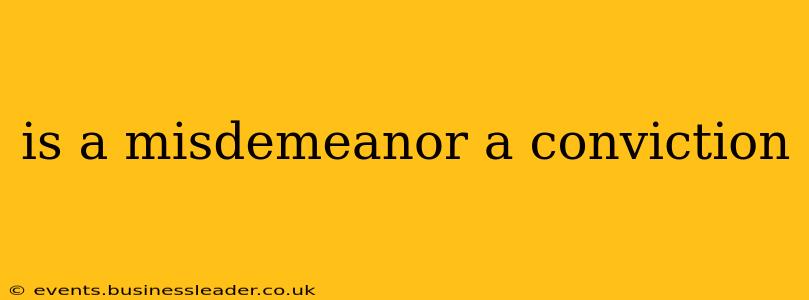Yes, a misdemeanor is a conviction. A conviction, in legal terms, means that a court has found someone guilty of committing a crime. This applies whether that crime is a felony, a misdemeanor, or even a less serious infraction. The key difference lies in the severity of the punishment and the long-term consequences. While both misdemeanors and felonies are criminal convictions, they carry significantly different weight in terms of penalties and future implications.
What is a Misdemeanor?
A misdemeanor is a less serious crime than a felony. These crimes typically involve less severe penalties than felonies, such as fines, shorter jail sentences (often less than a year), and probation. Examples of misdemeanors can include:
- Minor theft: Shoplifting, petty larceny.
- Simple assault: Pushing, shoving, or minor battery without serious injury.
- Vandalism: Damaging property with minimal monetary loss.
- Disorderly conduct: Public intoxication, fighting, disturbing the peace.
- Traffic violations: Depending on the jurisdiction and specifics, some traffic offenses can be misdemeanors.
The specific definition and penalties for misdemeanors vary significantly by jurisdiction (state, county, etc.). What constitutes a misdemeanor in one location might be a felony in another.
How Does a Misdemeanor Conviction Affect You?
While a misdemeanor might seem less severe than a felony, a conviction still has significant consequences:
- Criminal Record: A misdemeanor conviction becomes part of your criminal record, which can be accessed by background check services. This can affect your future opportunities.
- Employment: Many employers conduct background checks, and a misdemeanor conviction can hinder your ability to secure employment, particularly in certain fields.
- Housing: Some landlords conduct background checks, and a misdemeanor conviction could affect your ability to rent an apartment or house.
- Education: Certain educational programs or professional licenses might require background checks, and a misdemeanor conviction could be a barrier to admission or licensure.
- Travel: Some countries may deny entry to individuals with criminal convictions, including misdemeanors.
- Future Legal Issues: A prior misdemeanor conviction can affect sentencing in future cases, potentially leading to harsher penalties.
What is the Difference Between a Misdemeanor and a Felony?
The main difference boils down to severity and penalties:
- Severity: Felonies are far more serious crimes than misdemeanors and typically involve more significant violence, theft, or harm.
- Penalties: Felonies carry much harsher penalties, including lengthy prison sentences (often exceeding a year), substantial fines, and the possibility of mandatory minimum sentences.
This distinction is crucial because it determines the long-term ramifications of a conviction.
Can a Misdemeanor be Expunged or Sealed?
In some jurisdictions, it's possible to petition the court to expunge or seal a misdemeanor record after a certain period of time and good behavior. This process involves removing the conviction from public view, though it might still be accessible to law enforcement and certain government agencies. The eligibility criteria for expungement or sealing vary widely depending on the jurisdiction and the specific crime.
What Happens After a Misdemeanor Plea?
After pleading guilty or being found guilty of a misdemeanor, you will typically receive a sentence that could include:
- Fines: Monetary penalties imposed by the court.
- Jail time: Incarceration in a county jail, typically for a relatively short duration.
- Probation: Supervision by a probation officer, with conditions that must be followed.
- Community service: Performing unpaid work for the benefit of the community.
Conclusion
A misdemeanor is indeed a criminal conviction with lasting consequences. While less severe than a felony, it still leaves a mark on your record and can impact various aspects of your life. Understanding the implications of a misdemeanor conviction is crucial for making informed decisions and mitigating potential long-term effects. If you have questions or concerns about a misdemeanor conviction, seeking legal advice is strongly recommended.
